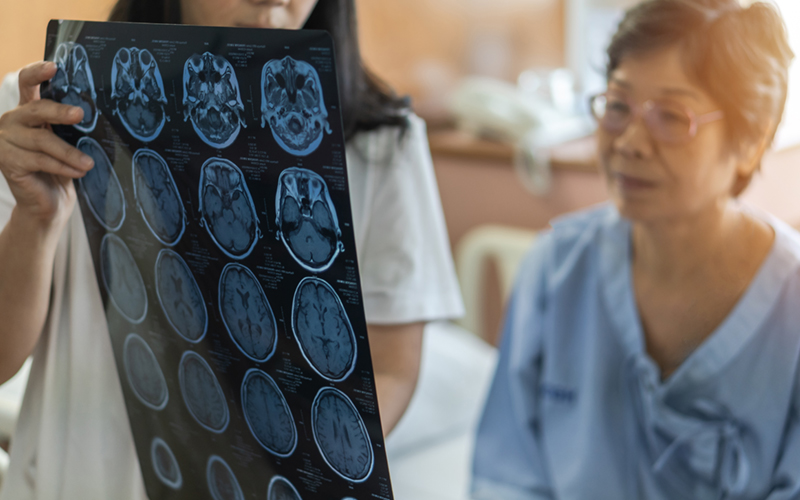California Brain Injury Attorney
- 550+ Google 5-Star Reviews
- $1 Billion won over 15 years
- Won’t settle for low offers, not afraid to fight for max value

Get a Free Case Evaluation
No fees until we win!
All San Diego Case Types

Personal Injury

Brain Injury

Car Accident

Slip & Fall

Truck Accident

Wrongful Death
California Brain Injury Attorney
Did you or your loved one suffer a brain injury in California through the careless or reckless actions of someone else? If so, you may be eligible to obtain compensation for your injuries through a personal injury lawsuit.
An experienced brain injury lawyer at Gomez Trial Attorneys can provide more information about this process. We have obtained over $500 million for our clients throughout the past 20 years, and our staff includes multiple Trial Lawyer of the Year recipients. We know how to pursue brain injury cases.
Whether you suffered the injury yourself or you are struggling with the financial and emotional weight of caring for a loved one, please give our California brain injury lawyers a call and let us see if we can help you.
What Is a Brain Injury?
The brain is the body’s most powerful organ, controlling everything from our ability to breathe, our heart rate, and our ability to wake up, to how we think and feel about the people and the world around us, and even ourselves. When the brain is damaged, it has limited ability to heal itself and the injury often results in deficits to vital functions. The outcome of any brain injured patient is impossible to predict, as it depends on factors such as the severity of the injury, the plasticity of the brain, the region of the brain and even the side of the brain that sustained the damage.
About 2 million people suffer from brain injuries in the United States each year. They may include:
- Acquired brain injuries are injuries to the brain that are non-hereditary, not congenital, degenerative, or caused by birth injury.
- Non-traumatic acquired brain injuries are those that are caused by electrical shock, near-drowning, toxic exposure, neurotoxic poisoning such as that caused by exposure to lead or carbon monoxide, stroke, or an infectious disease such as meningitis or encephalitis.
- Traumatic acquired brain injuries are caused by such things as falls from height, motor vehicle accidents, assaults, workplace injuries, gunshot wounds, and certain contact sports such as football or soccer.
Regardless of the cause, some of the deficits that may be acquired along with the injury include:
- Difficulty speaking and understanding language
- Memory loss
- An altered sense of taste or smell
- Ringing in the ears or hearing loss
- Loss of vision
- Loss of balance and coordination
- Inability to control emotions, impulses, or behavior
- Impaired logic
- Difficulty with sequencing or organization
- A lack of awareness of one’s own abilities
- Depression or anxiety
- The inability to breathe on one’s own
- Brain death
Complications of Brain Injuries
Brain injuries may produce a coma, which is a loss of consciousness lasting more than 24 hours after the injury. The coma may transition into other consciousness disorders, such as a persistent vegetative state or a minimally conscious state.
Besides consciousness disorders, these complications commonly occur with brain injuries:
- Increased cranial pressure due to the brain’s swelling and buildup of fluid in the brain. Swelling and fluid build-up can cause further damage to brain cells as well as decreased blood flow. This is a potentially life-threatening complication that often requires surgery, the administration of medication to reduce inflammation, and the placement of a shunt to drain the excess fluid.
- Low blood pressure, which can reduce the flow of needed oxygen to the brain.
- Fever. Because parts of the brain control the body’s temperature, if those portions of the brain are injured, it is not unusual for the patient to experience dangerously high fevers, particularly in the first hours after the injury occurs.
- Pneumonia, resulting from extended periods of time spent in the bed, not moving, which deprive the body of its ability to naturally clear the lungs.
- Infections. The protective layer around the brain can become infected due to depressed skull fractures or penetrating skull injuries. Infections can spread throughout the body, further damaging the brain and causing damage to other organs, as well.
- Deep vein thrombosis and other blood clots, caused by lack of movement. Clots can be life-threatening, as they can move to the lung and create an issue called Pulmonary Embolus.
- Pressure ulcers. Lack of movement over a period of time during recovery can cause the skin to break down. This is known as a pressure ulcer or bedsore. Pressure ulcers pose an additional risk of infection.
- Post concussion syndrome: Concussions can result in serious and lingering impacts such as dizziness, chronic headaches, memory loss, and insomnia.
- Post-traumatic epilepsy, which is seizures experienced after a brain injury. These seizures generally appear in the hours and days following the injury, but may be present months or even years later.
- Hormone changes and decreased hormones, which can cause changes in the injured person’s libido, as well as conditions such as hypothyroidism.
- Paralysis of the facial muscles or loss of sensation in the face.
- An increased risk of degenerative brain diseases such as Alzheimer’s or Parkinson’s disease.
Living With a Brain Injury
In a matter of seconds, a brain injury can not only change a person’s life forever, but can alter the lives of the injured person’s family members as well. These injuries impact every facet of a person’s life. Here are some of the changes that may occur:
- Work. With about 60 percent of severely brain injured individuals being unemployed two years after the injury, the inability to work as one worked before the injury is a major change. Many people cannot work at all. Those who can return to work may find that they are no longer able to handle the same position or workload. For many people, returning to work includes taking longer breaks, working for shorter periods of time and handling less workload.
- Home. A person with a brain injury may spend many months in the hospital or in a rehabilitation facility before finally being able to transition to home. While “going home” may seem like a happy ending to the journey, for most this transition is simply the beginning of a new part of the journey. Many brain injured individuals require modifications to their homes to accommodate their injury, such as wheelchair ramps, widened doors, lowered counters, and roll-in showers. Beyond these modifications, there is often a family also living in the home who is also forced to adapt to the injury. Spouses and children suddenly become caretakers. The sexual relationship between a brain injured person and his or her spouse may be altered by hormonal changes due to the injury as well as a shift in body image and acceptance. The parents of a formerly independent child may find themselves forced to quit working to care for the child after the injury. These changes can cause depression and anxiety for the brain injured person as well as the family members, with many family members reporting that they feel isolated or alone since their loved one’s injury and that no one understands what they’re going through.
- School. Just as a brain injured adult may have trouble returning to work, a child who is returning to school after suffering a brain injury may also deal with complexities. Public schools in California are required to provide reasonable accommodations for injured or disabled students, but often parents must aggressively advocate for these accommodations. Some accommodations that your child may require upon returning to school after suffering a brain injury include more breaks, less time at school or on task, the need for a personal assistance to help keep school work and tasks organized, additional time needed for assignments and tests, the ability to be graded on the quality of work rather than the quantity, the ability to have instructional time recorded for a memory-impaired child to play back later, and the ability to take tests in multiple choice form or orally if needed.
- Social life. The social lives of those who have suffered brain injuries are also altered as a result of the injury. The injured person may be unable or uninterested in doing activities that were previously enjoyed. Friends may find that they now have little in common with the injured person and these friendships will often fade away during the recovery process. Behavioral and impulse control may be altered by the injury, rendering the person of being able to participate in activities that require a quiet, orderly setting.
- Finances. Brain injuries are expensive, with lifetime costs often climbing into the millions of dollars. This, combined with the inability of many brain injured individuals to work, places a tremendous financial burden on the family. As many spouses of brain injured individuals and other family members who find themselves in a caretaker role may have to quit their own jobs to assist their loved one and be involved in his or her recovery, the money problems may linger for years. More than half of this country’s homeless population has suffered a brain injury. Some of these individuals were injured after becoming homeless. However, for many, homelessness is yet another complication of the injury.
San Diego Brain Injury FAQ
All unexpected, accidental injuries cause turmoil in victims’ lives. Few such injuries provoke as much fear and uncertainty for our clients, however, as do traumatic brain injuries (TBI). The physical and emotional impairments that accompany brain injuries leave victims and their families feeling as if a rug was pulled out from under their very existence. Their doctors cannot predict the pace or outcome of their recovery. They ride a roller-coaster of ups and downs, good days and bad days, which strains personal relationships and causes significant emotional challenges. Their personal finances often fall to pieces.
Clients of our firm struggling with the aftermath of a brain injury tend to have lots of questions about their legal rights, whether they themselves suffered a TBI or they’re caring for someone who has. Here are answers to some of the most common questions they ask us.
To learn more about your or a loved one’s legal options after sustaining a brain injury, contact an experienced brain injury attorney today.
Whom can I sue for my brain injury?
Clients in San Diego come to us because they have a sense that someone else’s poor decisions or reckless actions led to their or a loved one’s brain injury. They believe, rightly, that they should not have to carry the financial burden of brain trauma on their own. The person who hurt them should pay. But who is that?
As lawyers, our response to this question is not particularly satisfying to hear, but it is accurate: It depends. Brain injuries occur in a wide variety of scenarios—car accidents, falls on construction sites or slippery floors, being too close to explosions, and contact sports, to name just a few. In each case, the actions and decisions of one or more individuals or corporate entities could have contributed to the series of events leading to the resulting brain trauma. As lawyers, our job is to ask: Which of those persons or companies had a legal duty to act in a way that would not put our client in harm’s way, failed in that duty by taking or failing to take some particular action, and, as a result, caused our client’s injury? Generally speaking, those are the people or corporations our clients might have the right to sue.
Sitting down with our experienced San Diego brain injury attorneys as soon as possible after an accident or incident leaves you or a loved one injured is the best way to pinpoint whom you might pursue.
What is a legal claim for my brain injury worth?
You will hear this from us a lot, but again, it depends. The value of a legal claim varies due to a host of factors, most of them completely out of your control. As a general matter, the amount of money you may have the right to receive through insurance coverage, legal action for damages, or some combination of the two, will depend on:
- The nature of your brain injury and its effects on your life. Brain injuries range in their effects, from headaches, fatigue, and brain fog, to motor, cognitive, and emotional deficits. The larger the impact an injury has on your life, the more money you may have the right to recover.
- Your age and health. It may seem crass, but the younger and healthier a victim of brain injury was at the moment of an accident, generally, the larger the amount of money that the victim may have the right to obtain as damages. That is because insurance companies and juries take into account the length of time that a person may have to struggle with a brain injury, and the scope of life opportunities the injury will cause.
- Where compensation might come from. Because our legal system uses money as an imperfect means of fixing the harm done to a brain injury victim, the value of a claim depends on the potential sources of that money. After all, a $1 million claim is not really worth $1 million to the victim if the party with legal liability has no means to pay that amount. A lawyer’s job, in part, is to work hard to identify parties who have a legal liability and the means to pay.
We have listed the three factors above as broad examples. Many other variables can affect the value of your brain injury claim, particularly because brain injuries, unlike many other types of physical injuries, can present highly unpredictable and up-and-down paths to recovery, which can make it difficult to pin down the amount of money you need to support you through that recovery. Speak with our experienced attorneys to learn more.
Can I afford a brain injury lawyer?
Yes, you can. Experienced San Diego brain injury attorneys represent their clients on a contingency fee basis. That means they only get paid if their clients get paid. Through that arrangement, victims of brain injuries get access to lawyers who have a broad knowledge of how to recover compensation for even the most complicated brain injury cases.
How long will it take for me to recover compensation for my brain injury?
No lawyer can truly answer that question without knowing the specifics of your case, and even then it depends. Some factors that dictate the pace of a brain injury case are within our clients’ control, but most are not. For example, the number of parties, the complexity of the brain injury at issue and the circumstances that led to it, and the dollar value of the claim can all influence how long a case takes to settle or reach a jury trial.
Our clients are always in charge—we try to give them the best legal advice possible, but our clients always decide when to begin and end a case, depending on their personal priorities.
Should I accept a settlement offer from an insurance company for my brain injury?
Brain injuries can leave their victims, and victims’ families, struggling financially. The symptoms that accompany many brain injuries often keep victims out of work and sometimes leave them almost totally incapacitated. The loss of income, combined with the cost of medical care, can put extreme strain on a person’s or a family’s finances.
Sometimes, seemingly out of the blue, an insurance company will step into the scene and offer the brain injury victim or victim’s family a settlement. The offer might even seem like a lot of money. Should the victim take it?
In almost all cases, NO. And never without speaking with an experienced brain injury attorney first. If an insurance company offers you a settlement, then the insurance company thinks its customer—the person or company it insures—has a legal liability for causing your brain injury. Approaching you directly with what looks like free money is the insurance company’s way of trying to get itself, and its customer, off the hook financially for as little money as possible—and, you can be certain, for less money than you need to pay for the cost of your injuries.
In short, taking the money means giving up significant legal rights. Never, ever do it without first talking to an attorney who has the experience to figure out how much money you should get as a settlement, and the know-how to negotiate with an insurance company or defense attorney to get you the proper compensation.
Who is the right attorney for my brain injury case?
It is not difficult to find a lawyer around San Diego who advertises for personal injury law. They advertise on TV, on highway billboards, and on the internet. The trick, however, is sorting through your options to find the lawyer best-suited to handle a case like yours.
Brain injuries, as we have said, come with significant complexities and challenges for their victims—and for the victims’ lawyers.
The right lawyer for your brain injury case is, almost assuredly, someone who has years of experience representing brain trauma victims. Why? Because to get you the most money for your injury, a lawyer needs a working understanding of the medical and financial aspects of recovering from a brain injury. Trust us: Your case will suffer if your lawyer has to get up to speed on how injuries like yours work, and what they cost over a lifetime to treat.
It also helps to find an attorney who has represented clients who suffered injuries in the same type of accident or incident that hurt you. For example, even a lawyer who has brain injury experience might not have experience with brain injuries caused by the concussive force of an explosion or a contact sport hit. Look for a lawyer who understands how to investigate and analyze damages arising from both your injury and the manner that the injury occurred.
Finally, choose a lawyer with the resources to match the needs of your brain injury case. Does the lawyer have a team that supports him or her, so that he or she can focus on the legal and factual details of your brain trauma that will decide how much money you should receive? Does the lawyer work with a network of medical and forensic experts who can offer advice about technical aspects of your brain injury that could make the difference between a success and a disappointment? A well-resourced lawyer can do more for you, plain and simple.
When should I call a brain injury lawyer?
Right away. Oftentimes, that means that the family member of a brain injury victim will make the first call to a law firm, and that is okay. The sooner you or your family member connects with our experienced San Diego brain injury attorneys, the better the chances of recovering every dollar of compensation you need, and of avoiding the legal and administrative pitfalls that can make a nightmare of getting the medical care and support you need. Reputable San Diego brain injury lawyers offer free, confidential, no-obligation case evaluations, so you have nothing to lose—and potentially lots to gain—by sitting down with an experienced attorney right away.
How can I help my brain injury case succeed?
First and foremost, take care of yourself. See a doctor, follow the doctor’s treatment plan, and commit yourself to achieving maximum recovery from your brain injury, even if it means trusting others to handle other parts of your life that you might otherwise want to do for yourself. Your brain is an organ of your body, and like any body part, it needs time and care to heal.
As an added benefit, following a treatment plan puts you in the strongest possible position to recover the compensation you deserve for your injuries; not following a treatment plan, on the other hand, can do serious harm to your legal rights. Keeping all of your medical and insurance records in a file where you can access them easily can also help.
Also (and we know we sound like a broken record on this), do not wait to contact an experienced San Diego brain injury attorney who can lend support to your recovery. Attorneys can take over the legal and administrative aspects of getting you the money you deserve so you can focus on your recovery.
The reality of most brain injuries is that they can all too easily rob you of the strength and focus needed to protect your rights on your own, while also throwing your family life into disarray. A lawyer can take the weight of legal and insurance concerns off of your shoulders, making your life—if not easier—at least a little more manageable.
Hope for a Cure
Researchers from the University of California Irvine recently developed a new cell therapy that has shown promising results in treating memory loss and preventing seizures in brain injured patients. The researchers transplanted embryonic progenitor cells that can generate inhibitory interneurons—a cell able to control the activity of brain circuits—into brain injured mice. These transplanted neurons migrated into the injured area, where they may form new connections with injured cells.
A month after treatment, the mice showed signs of increased memory and could complete memory tasks just as well as mice who had not suffered an injury. It also prevented the mice from developing post-traumatic epilepsy, a common complication of brain injuries. The research team explained the inhibitory interneurons are critical for memory and they’re vulnerable to dying after a patient has suffered a brain injury.
While researchers could not stop these interneurons from dying in the first place, they were pleased that they found a way to replace these vital cells and rebuild their circuits. Currently, there are no effective treatments for memory loss in brain injured patients, but the researchers stated that with their project, they are getting closer.
Let Our California Brain Injury Attorneys Help You
If your brain injury was caused by the negligent or reckless actions of another person or entity, California law provides an avenue for holding that at-fault party responsible and allows you to pursue compensation through a personal injury lawsuit. Liability for your injuries is established by demonstrating that the at-fault party owed you a duty of care, that this duty of care was breached by careless or reckless behavior, and that this breach in the duty of care resulted in your brain injury and the resulting impacts to your life.
Some of the damages you may recover through a personal injury lawsuit include:
- The costs of medical treatment for your injury. This includes costs for ambulance transportation, treatment in the emergency room, diagnostic testing, surgical services, hospitalization, prescription and IV medications, rehabilitation and physical therapy. Additionally, you may recover the costs of modifications to your home and assistive devices such as wheelchairs.
- Lost wages due to being too injured to work or forced to miss work to attend doctor’s appointments for the treatment of your injury. If your injury forces you to take a different, lower paying job or creates permanent disability and renders you unable to work, you may also recover lost earning capacity.
- Non-economic damages to compensate you for the impacts your brain injury has on your quality of life, such as pain and suffering, emotional distress, and loss of enjoyment of life. You may also recover damages for your spouse for loss of consortium, which is the loss of companionship or intimacy that is often experienced with this type of injury.
The experienced California personal injury lawyers at Gomez Trial Attorneys are happy to provide knowledgeable guidance and aggressive representation to brain injured individuals and their families through the legal process of obtaining compensation. For a free consultation with one of our experienced brain injury associates, contact Gomez Trial Attorneys online.
Our Process... Easy as 1. 2. 3!
Call Us
We will determine your case and submit
We get to work
You will get regular update from us
Win
Collect your compensation

550+ 5 Star Reviews
-
“John helped me find doctors, he referred me to his neurologist, his physical therapist, I mean, anything I needed he was right there, every step of the way. I couldn’t have asked for a better result from all of this, I would absolutely recommend Gomez Trial Attorneys.”
-
“During the time I was working with Gomez Trial Attorneys, they treated me very, very well. 100% of the time, they believed me, and they were very compassionate. They felt sorry for what happened and they understood the therapy process.”
-
“They held my hand the whole time and kept me in the loop every aspect of my case which was very refreshing to me. They helped me get my settlement offer as fast as possible and I was able to keep my farm”
-
“The Gomez experience was the best experience it could be for me really, only positive things to say. They really were there every step if the way. Thanks to Gomez Trial Attorneys my dad is able to support my family as a single father”
-
“He opened the door for me to join his firm to help other brain Injury survivors and I never met another firm who is like this who was so understanding and caring who took the extra step and walked the extra mile with their clients and this is the best”
-
“I am very satisfied with the outcome with Gomez and I would definitely recommend Gomez to anybody, we tell people all the time, Get Gomez! They are really thorough with everything and they make you feel real comfortable.”
-
“Just helped us through, guided us through, I kept notes all those years, we had questions all the time and they would always keep us informed of what was going on. They just unlayered it, layer by layer, I’ve never seen anything like them. Thank God for them.”

